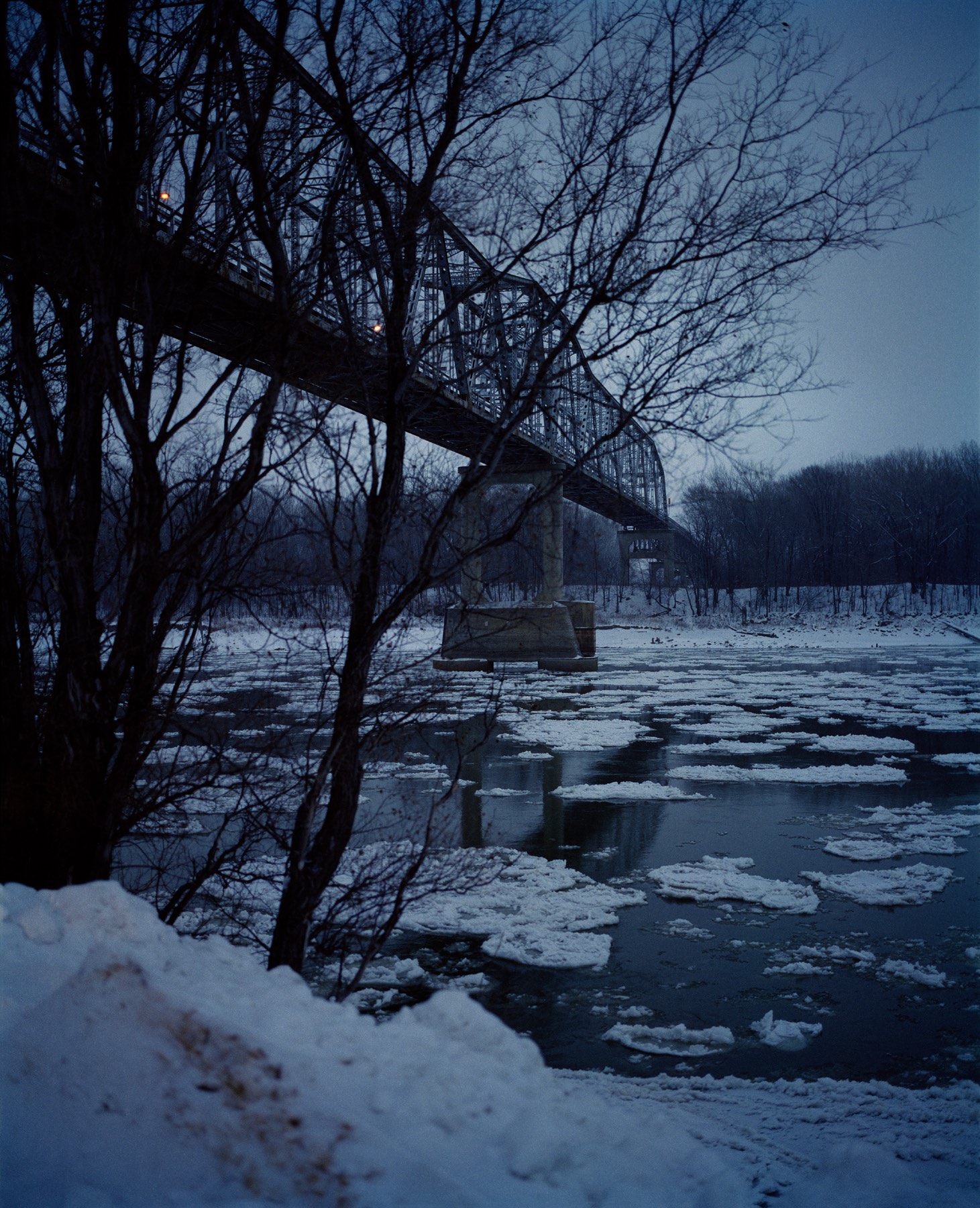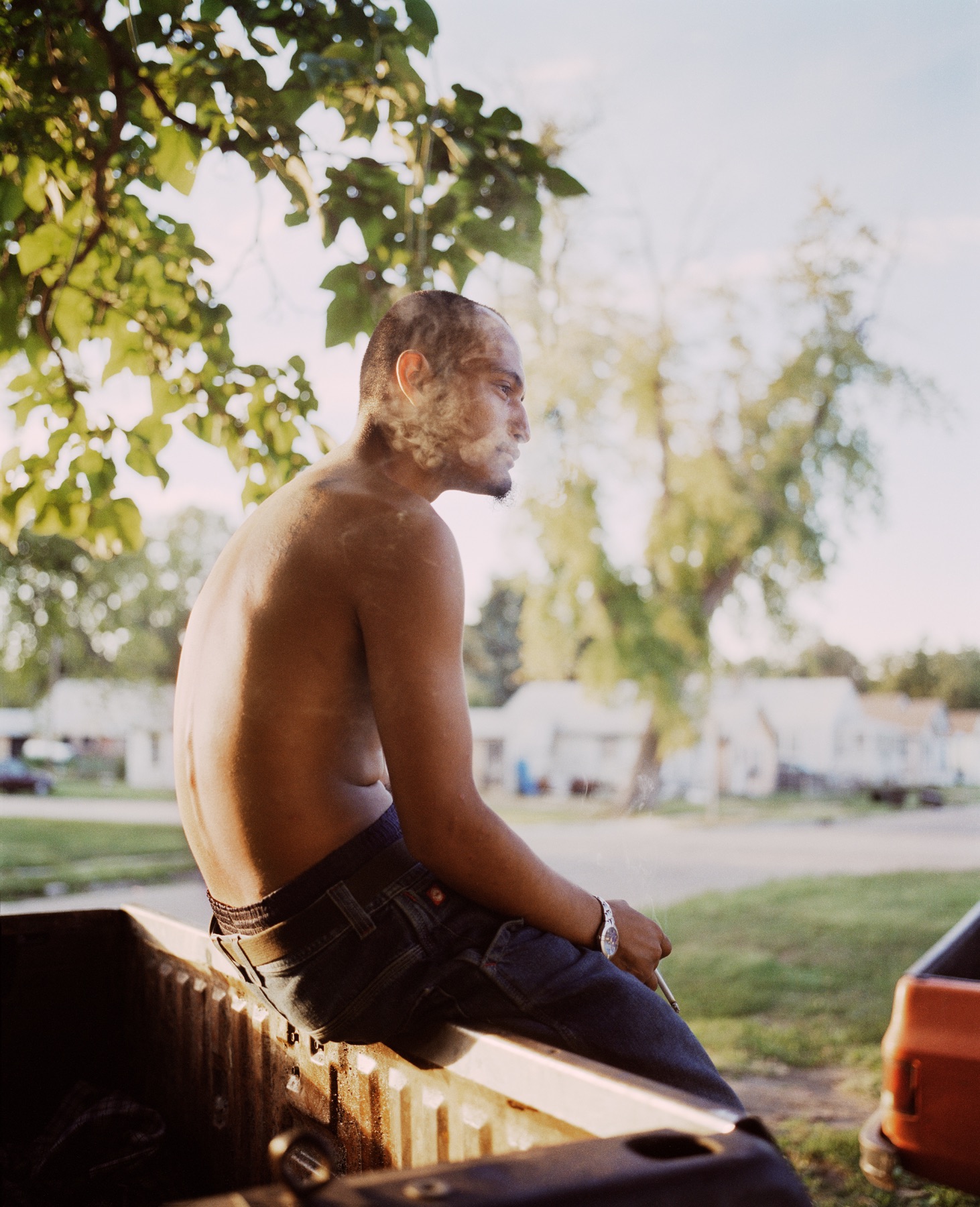Lyrical portraits of Omaha, America’s Heartland
- Text by Miss Rosen
- Photography by Gregory Halpern

The American Heartland has many connotations. It’s a mythical term steeped in images of family, religious community, hard work, drinking, and the army – each rooted in the archetype of the All-American Man.
It has fascinated painters and photographers alike, from Robert Frank to Dorothea Lange, Edward Hopper to Grant Wood. For the past 15 years, Magnum photographer Gregory Halpern has immersed himself in this fabled world, capturing a panoply of historic symbols to create the new book Omaha Sketchbook (MACK) and an accompanying exhibition of the photographs.
“It’s the experience of modern life in America, just as the Impressionists painted the experience of modern life in France,” says Giles Huxley-Parlour, gallerist. “It’s a national obsession.”
“As an artist growing up in America, this is a subject that is irresistible. If you look at the paintings of Hopper, they’re about the emptiness of the heart of the American Dream. It’s an endlessly fascinating [subject].”
In Omaha Sketchbook, Halpern captures the nostalgia of the titular city. It’s as if someone stopped the clock in 1963: there are scenes of sun-drenched family homes, the church, the football team suited up, the Boy Scouts in their regalia, the meat plant, and the water tour at sunset. It is an epic poem to a city and nation built on the undying belief in Manifest Destiny.

Boy Scouts 1, Omaha, NE © Gregory Halpern

Bridge (Evening), Omaha, NE © Gregory Halpern
“There’s a strong sense of vernacular poetry in the book: lots of overexposed blurred pictures, power stations, faded pictures, casually composed pictured deliberately snapshot to give a sense of a language that sums up the day to day aesthetic,” Huxley-Parlour says.
“There’s a look in the book of the disposable Instamatic Kodak; the one-time-use cameras you used to buy for $5, and there’s a feel of photographs that are not about composition and elegance but are about raw feeling, power, and place.”
At the same time, there is a sense of the monumental within these quiet images of daily life; a feeling of something heroic that tugs at the heartstrings of nationalists.
“My feeling is that this isn’t about the future, but an America rooted in the past,” Huxley-Parlour says. “It’s about this old fashioned notion of American values in a fairly normal city, in a normal part of America. This is the sort of place where right-wing values that hold firm and always have done. It’s a view of a traditional America on the precipice of modernity. I don’t see much of the future there.”

Card Game, Nebraska, Correctional Youth Facility, Omaha, NE © Gregory Halpern

Julia, Reserve Officer Training Corps, Omaha, NE © Gregory Halpern courtesy Huxley-Parlour Gallery

Lewis, Football Practice, Omaha, NE © Gregory Halpern courtesy Huxley-Parlour Gallery

Dog on Hill (Sunrise), Omaha, NE © Gregory Halpern courtesy Huxley-Parlour Gallery

Omaha, NE (Downtown Through Sunflowers) © Gregory Halpern courtesy Huxley- Parlour Gallery

James in Car, Omaha, NE © Gregory Halpern courtesy Huxley-Parlour Gallery

Emilio, Omaha, NE © Gregory Halpern courtesy Huxley-Parlour Gallery

John, Service Clerk, Cubby’s Grocery Store, Omaha, NE © Gregory Halpern courtesy Huxley-Parlour Gallery
Gregory Halpern: Omaha Sketchbook in on view at Huxley-Parlour Gallery in London through October 12, 2019.
Follow Miss Rosen on Twitter.
Enjoyed this article? Like Huck on Facebook or follow us on Twitter.
Latest on Huck

Clubbing is good for your health, according to neuroscientists
We Become One — A new documentary explores the positive effects that dance music and shared musical experiences can have on the human brain.
Written by: Zahra Onsori

In England’s rural north, skateboarding is femme
Zine scene — A new project from visual artist Juliet Klottrup, ‘Skate Like a Lass’, spotlights the FLINTA+ collectives who are redefining what it means to be a skater.
Written by: Zahra Onsori

Donald Trump says that “everything is computer” – does he have a point?
Huck’s March dispatch — As AI creeps increasingly into our daily lives and our attention spans are lost to social media content, newsletter columnist Emma Garland unpicks the US President’s eyebrow-raising turn of phrase at a White House car show.
Written by: Emma Garland

How the ’70s radicalised the landscape of photography
The ’70s Lens — Half a century ago, visionary photographers including Nan Goldin, Joel Meyerowitz and Larry Sultan pushed the envelope of what was possible in image-making, blurring the boundaries between high and low art. A new exhibition revisits the era.
Written by: Miss Rosen

The inner-city riding club serving Newcastle’s youth
Stepney Western — Harry Lawson’s new experimental documentary sets up a Western film in the English North East, by focusing on a stables that also functions as a charity for disadvantaged young people.
Written by: Isaac Muk

The British intimacy of ‘the afters’
Not Going Home — In 1998, photographer Mischa Haller travelled to nightclubs just as their doors were shutting and dancers streamed out onto the streets, capturing the country’s partying youth in the early morning haze.
Written by: Ella Glossop